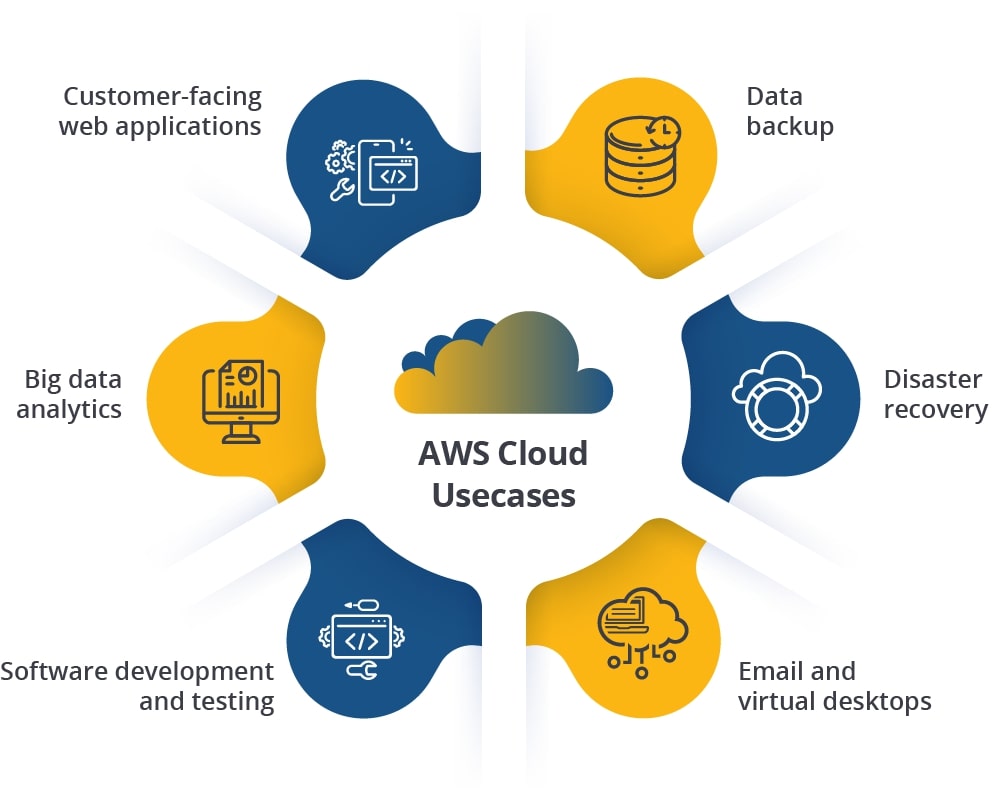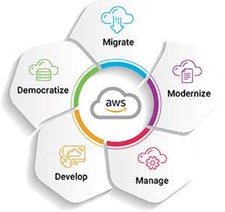One of the most significant business benefits of AWS is that it is an exhaustive platform for building a modern data strategy for keeping ahead of the curve. However, many businesses need help to put together and evaluate a business case for the Cloud. They get bogged down in connecting their operational activities to Cloud and need help understanding their infrastructure needs and go-to strategy. Learn how Jade Global can help you get the best AWS Cloud business benefits.
The Cloud computing market is expected to hit the $1 trillion milestone by 2028. Also, reports affirm that by 2024, most businesses anticipate spending $8 of every $10 on cloud-based IT hosting. So clearly, cloud adoption is no longer a question of whether to use it but of "how soon" and "to what extent."
As the global cloud migration continues, trust builds in top cloud service providers that are capturing the biggest share of the Cloud market. Here, AWS is one of the most popular cloud providers, with a 33% market share.
AWS – A Leading Public Cloud Platform Provider Today
Acronym for Amazon Web Services. AWS is forging ahead in the cloud market by offering secure and scalable computing power, content delivery, database storage, and other cloud services. Leading enterprises, as well as SMEs and startups, worldwide are capturing the business benefits of AWS.
What companies use AWS? Businesses of every size, type, and industry can use the AWS cloud for a wide variety of use cases,

Businesses may create a cutting-edge data strategy using AWS Cloud to stay on top of the game. However, creating and analyzing a business case for the Cloud is challenging for many companies. They are conscious of the dependability and security of cloud investments. However, they need help to comprehend their infrastructure requirements and go-to strategy and become tangled up in linking their operational activities to the Cloud.
Taking the cue, this blog by Binoy Das (Associate Director - Managed Services - AWS, Jade) offers details on how businesses can use the most recent AWS services to future-proof their company.
Through this blog, you can understand the business benefits of AWS Cloud and understand how Jade can assist you in overcoming implementation and migration difficulties so that you can get the highest ROI as you take on the next phase of cloud transformation.
Who Can be the Ideal Consumers of AWS Cloud?
There is not a single customer segment that cannot benefit from using AWS Cloud, although it is easier for some to reap the benefits of using the Cloud than others.
AWS for Startups
Many startups have moved on to become unicorns and beyond. They are sort of digital-native companies whose business model is naturally designed around the digital value chain. Their dependence on IT is so much that they have no options to do it the old way. They cannot wait weeks or months to test a new idea or roll out a new feature. Naturally, they are attracted to the instant provisioning of infrastructure on AWS. Digital-native companies also try to push the boundaries of what is always possible. They are always looking for ways to shift complexity towards a point where it can be handled in a more predictive manner.
AWS provides various monitoring, governance, cost management, and other automation services that allow these customers to easily build processes to manage their IT at a reduced manpower cost while, at the same time, providing better services to their customers by decreasing downtime and increasing responsiveness.
Netflix, Uber, and Airbnb are widely known examples of such success, but there are many more examples in FinTech (Coinbase, NerdWallet, Robinhood), Manufacturing (Xilinx, MakerBot), Education & Training (Coursera, Duolingo), Transportation (Lyft), Media & Entertainment (Lionsgate, Flipboard) are just a few names that come to mind. One common thread that you'll see across all these companies – they all have a very slim margin. Hence, they had to be extremely nimble when it came to technology, and that's where AWS helped.
AWS for Enterprises
Enterprise customers use AWS in many ways, depending on where they are in their modernization journey. Large retail, travel, manufacturing, and financial services organizations are fully embracing AWS to run their business-critical workloads. Capital One, for example, has built its complete banking solutions on AWS. GE Oil and Gas moved its complete portfolio of applications to AWS, and GE Aviation is doing so. Nissan is another enterprise that is in the middle of a data center exit, moving everything to AWS.
These enterprises are not just looking for low-cost infrastructure. Rather, they have realized that they can build new capabilities on AWS, using newfound AWS technologies such as
- High-speed data streaming
- Low-maintenance data warehouse
- Highly scalable transactional data stores,
- Event-driven integration technologies
- Ready-to-train machine learning models.
Often, they use these technologies to facilitate things such as straight-through business processing, omnichannel experience for customers, more human-oriented interfaces using voice and chatbots, and predictive power to stay on top of trends. All of these were much harder before on AWS, but managed services provide the platform to build many of these advanced technologies on AWS.
AWS Cloud Business Benefits
Cost Savings
AWS, or any public cloud movement, is about increasing efficiency in the cost of computing and operational resources; it is not about running cheaper. In fact, if you only compare the cost of running one machine on AWS or any other cloud to that of running the same one yourself, you might barely break even. So, no customer considers moving to AWS purely from a cost-savings perspective, although that's a driver and done right; it does even become a reality.
How AWS Cloud Drives Cost Savings - Here are some examples.
- Manufacturing Sector- When various GE subsidiaries started moving their workloads to the Cloud, the driver behind that decision was to make their IT more agile. As they were going through a reverse merger, it was impossible to suddenly scale up their IT team to manage each entity's infrastructure using conventional practices. So, they took the time to engage with AWS partners and adopted a phase-wise approach to move their back-office ERP/CRM systems to AWS. This not only reduced their fixed cost overhead but, more importantly, improved their management and governance processes, so each subsidiary could manage its own IT in a self-service manner.
While going through this transformation, they came to realize the value of AWS services in areas of industrial automation IoT, data ingestion and analytics, real-time data warehousing, and such. So, moving on, they started to build systems around shop floor management, design automation, and manufacturing planning. These were the areas that traditionally used to run close to factory locations, hence, were harder to manage.
With cloud-based manufacturing systems, they are now better positioned to adopt lean manufacturing principles, making resource-intensive manufacturing segments leaner and more cost competitive.
- Financial Sector - In another example, FINRA (Financial Industry Regulatory Authority), in processing billions of market events and applying analytics to ensure fairness in market trades, chose to use AWS for its event-driven serverless technologies. By rearchitecting their systems to use native AWS serverless and analytics services, they achieved scalability and improved efficiency by a factor of seven while reducing cost by a factor of two.
- Automobile Sector - Nissan Motors realized that supporting its manufacturing, distribution, marketing, and finance operations across Europe and North America requires managing terabytes of operational data in central locations, bogging down the performance of its core SAP system.
So, they chose to adopt standard cloud solutions across regions. A cloud that is built on a robust architecture core and could allow them to decentralize the operational database standardize the computing needs for running the SAP systems. In addition, use a low-cost object storage service like Amazon S3 to facilitate building a centralized data lake. It also helps promote analytics at speed previously impossible with on-prem infrastructure.
Access to a Huge Partner Community
Another major advantage of using AWS services is access to a huge partner community. Most of the major enterprise and integration application providers actively work with AWS and, in many cases, work alongside AWS Consulting partners to provide ready-to-deploy industry solutions that reduce variability improve security posture and accelerate the overall modernization journey.
SAP, for example, works with AWS to provide certified appliances that are ready to run SAP HANA with ease, makes the licensing easy to port, and facilitates the implementation with partners such as Jade Global, who brings in decades of application and infrastructure experience.
Boomi is one of the leading system integration platform providers in use today. Customers have traditionally used Boomi following a hub-and-spoke network model, whereby Boomi Atoms and Molecules run in a hub network with connectivity to all enterprise systems. While this works, it also creates a single point of failure, which requires making provisions for robust network connectivity and capacity. This eventually adds strain to IT resources. Especially when customers are moving many enterprise applications either on AWS or using other SaaS providers, they feel the integration layer needs to be modernized. Here the need is for an enterprise bus that easily spans regions that are secure, failsafe, and highly available. Boomi on AWS provides just that.
Jade Global provides a turnkey solution to host and manage Boomi using AWS infrastructure., Running enterprise solutions on AWS means access to experienced partners who can provide end-to-end offerings – from infrastructure to application to incident management.
How does Jade Global Help Businesses Realize the Real Benefits of AWS Cloud?
Reverse movement of applications, that is moving back to on-premises from cloud is also a common scenario. A small fraction of organizations considers moving applications back to on-premises because they fail to capture the true AWS Cloud benefits. Jade Global AWS Cloud services is controlling this reverse movement, by enabling the businesses to realize the real benefits.
Usually, the reverse movement decisions are often driven by financial projections, whereby finance needs to see the net positive ROI of running applications on the Cloud. Let’s understand.
Why do businesses move their applications back to on-premises?
When an organization considers moving its applications back to on-premises, usually one of two things happens-
- First, the organization might have a huge storage-intensive workload with a frequent need to access data out of the Cloud.
- Second, they might have only dabbled in the Cloud with some non-critical applications, while most of their crucial business systems are still on-premises
While, in a small percentage of cases, these are valid causes the failure to realize value from the Cloud comes down to suboptimal management and governance.
Many organizations, due to poor planning during the migration stage, do not prioritize cost. And in the absence of an ongoing FinOps strategy, they end up bulk-migrating their apps and staying there. Then comes the ops person, who wants to make the deployment more robust and start adding capacity indiscriminately without looking at the utilization rate and investing in things like containerization. There could also be pressure to increase the SLA (service level agreements), and many times, customers start over-investing into HA and DR without properly analyzing SLAs (service level agreements) for groups of applications.
That is where Jade Global's FinOps offering comes into play. Using a cloud value framework, Jade performs an architectural analysis and provides the following AWS Cloud business benefits:
- Reduction in Total Cost of Ownership (TCO)
- Automation, increasing staff productivity
- Better visibility through billing and cost management
- Tighter control of AWS expenses.
For customers running workloads on the AWS Cloud, Jade Global provides optimization and enhancement support – improving ROI through architectural enhancement, and making way for new services, APIs, and data stores, built on top of AWS.

Jade Global managed services to help businesses capture AWS cloud migration advantage and save them from the dreaded reverse migration. To know more about how Jade can help with AWS Cloud migration, cost optimization, cloud modernization, data democratization and other services, check out AWS Cloud Services.
Also, explore the top business consulting companies in California by DesignRush











